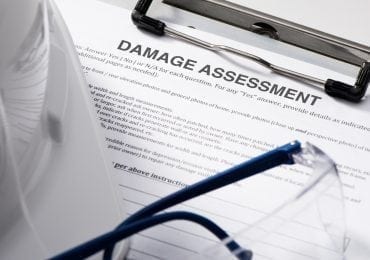Dos and Don’ts for Handling Property Damage
As a landlord, you have certain legal responsibilities in terms of maintaining the property. At the same time, if your tenant damages your property in some way, you are not obligated to pay for these repairs yourself. In order to ensure you handle the situation professionally, here are some dos and don’ts to keep in mind.
Don’t: Automatically Go for the Eviction
While it is possible to work toward evicting your tenant over damages, this may not be the best course of action. Rather than automatically going for an eviction, it is generally best to try to settle the issue with your tenant. Not only is this more likely to help with getting the damage paid for by the client, but it will also help you to keep an otherwise good tenant in place. Obviously, if this is an ongoing issue and you are genuinely concerned that it will happen again, an eviction may be warranted. If the tenant has otherwise been a good one, however, it is probably better to work together to resolve the issue in a positive manner.
Do: Know the Difference Between Wear And Tear and Damage
As a landlord, you are expected to cover the expenses that are associated with normal wear and tear. Things such as loose caulking, faded curtains, lightly scuffed hardwood floors and worn electrical switches are all considered to be a part of normal wear and tear. Damage, on the other hand, is caused by carelessness, accidents, negligence or abuse of the property. If true damage has occurred to your property, you are entitled to financial compensation.
Don’t: Fail to Document
To ensure you have a solid claim against damages, take pictures of the property prior to move in and document the condition of the property before allowing the tenant to move in. Once damage has occurred, take pictures of the damage in order to document why you are billing your tenant for repairs.
Do: Give the Tenant the Opportunity to Make Repairs
Before paying someone to make repairs to the property, you should provide your tenant with the opportunity to make the necessary repairs. This does not mean allowing the tenant to play handyman. Rather, you should allow the tenant to seek out and pay a licensed repairman to make the necessary repairs. If the tenant decides to forego this opportunity, you can then make the repairs yourself and present the tenant with the bill.
Don’t: Wait for the Tenant to Move Out to Collect Damage Expenses
While you may have a security deposit from which you can deduct the costs associated with the damage, you should not simply use those funds to pay for the expense. Rather, the tenant should be expected to pay for the expenses in a timely manner. Of course, if this doesn’t happen, you are entitled to deduct the cost of these expenses from the security deposit. If there is no security deposit or if the cost of the damages is more than the amount of the security deposit, you may have to sue your tenant in order to be properly compensated.

